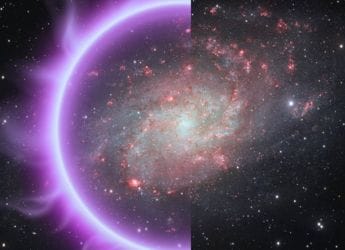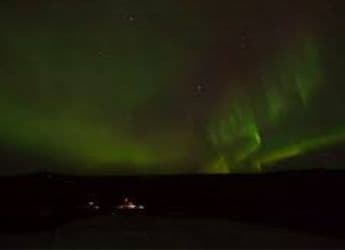- Home
- Science
- Science News
- Dark Matter and Dark Energy Might Not Exist After All, New Study Suggests
Dark Matter and Dark Energy Might Not Exist After All, New Study Suggests
A new equation redefines cosmic forces, explaining the universe without dark matter or dark energy.

Photo Credit: NASA
A new theory claims the universe’s forces weaken over time, replacing dark matter and energy.
A controversial new study has a rival to this narrative of the origins of the universe — the echoing walls of a previous universe that seem to exist in ours, according to new research. Instead, they might arise naturally as the universe's basic forces slowly lose their punch over time. The groundbreaking concept, developed by the University of Ottawa physicist Rajendra Gupta, turns cosmic orthodoxy on its head—and has the potential to shake up astronomers' understanding of how the universe is made, including galactic motion and even basic time.
Evolving Cosmic Forces May Explain Universe's Mysteries Without Dark Matter or Dark Energy
According to a report published in the peer-reviewed journal Galaxies, Gupta's model showed that as the universe expands, its forces — such as gravity — weaken infinitesimally. This decay can act like the stuff scientists have long invoked to help explain dark energy, the mysterious force accelerating cosmic expansion, along with dark matter, which is supposed to explain why galaxies rotate faster than their heft suggests. Both of these phenomena could, according to Gupta, instead stem from the same time-evolving constants of nature, and there would be no necessity for a pair of cosmic components.
Gupta's model introduces a parameter called “α”, which changes depending on how ordinary matter is distributed. In galaxy cores, the effect is weaker but stronger in empty regions—explaining fast star motion and cosmic behaviour without dark matter.
The study suggests the universe may be nearly twice as old, explaining the rapid early formation of galaxies and black holes after the Big Bang. Gupta notes that this approach removes the need for hypothetical particles, making the universe's evolution more consistent with observable physics.
The findings may reshape cosmology, challenging costly dark matter hunts, as Gupta suggests evolving natural forces—not hidden particles—explain cosmic behaviour.
Get your daily dose of tech news, reviews, and insights, in under 80 characters on Gadgets 360 Turbo. Connect with fellow tech lovers on our Forum. Follow us on X, Facebook, WhatsApp, Threads and Google News for instant updates. Catch all the action on our YouTube channel.
Related Stories
- Samsung Galaxy Unpacked 2025
- ChatGPT
- Redmi Note 14 Pro+
- iPhone 16
- Apple Vision Pro
- Oneplus 12
- OnePlus Nord CE 3 Lite 5G
- iPhone 13
- Xiaomi 14 Pro
- Oppo Find N3
- Tecno Spark Go (2023)
- Realme V30
- Best Phones Under 25000
- Samsung Galaxy S24 Series
- Cryptocurrency
- iQoo 12
- Samsung Galaxy S24 Ultra
- Giottus
- Samsung Galaxy Z Flip 5
- Apple 'Scary Fast'
- Housefull 5
- GoPro Hero 12 Black Review
- Invincible Season 2
- JioGlass
- HD Ready TV
- Laptop Under 50000
- Smartwatch Under 10000
- Latest Mobile Phones
- Compare Phones
- iQOO 15 Ultra
- OPPO A6v 5G
- OPPO A6i+ 5G
- Realme 16 5G
- Redmi Turbo 5
- Redmi Turbo 5 Max
- Moto G77
- Moto G67
- Asus Vivobook 16
- Asus Vivobook S16 (2026)
- Black Shark Gaming Tablet
- Lenovo Idea Tab Plus
- HMD Watch P1
- HMD Watch X1
- Haier H5E Series
- Acerpure Nitro Z Series 100-inch QLED TV
- Asus ROG Ally
- Nintendo Switch Lite
- Haier 1.6 Ton 5 Star Inverter Split AC (HSU19G-MZAID5BN-INV)
- Haier 1.6 Ton 5 Star Inverter Split AC (HSU19G-MZAIM5BN-INV)

















